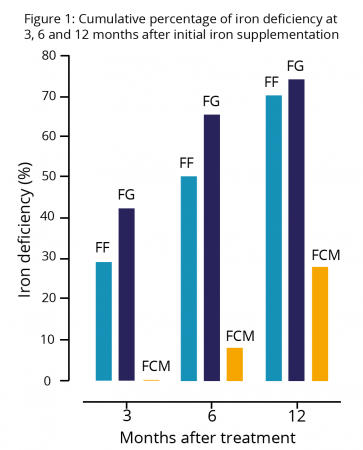Iron supplementation as deficiency treatment
Iron supplementation as deficiency treatment
Comparing oral and intravenous iron supplementation as deficiency treatment after Roux-en-Y Gastric Bypass
With a 66% prevalence among Gastric Bypass patients, iron deficiency is one of the most common postoperative deficiencies. Even before surgery, patients are already at risk, mainly because of their food pattern being low in iron. Current knowledge about the optimal dose and mode of iron supplementation for both prevention and treatment of iron deficiency after bariatric surgery, is limited.
Different iron supplementation methods
The aim of this study was to compare the efficacy of different iron supplementation methods among women with iron deficiency after a Roux-en-Y Gastric Bypass. 120 women were selected and randomized into three groups, differing in mode of supplementation (e.g. two different modes of oral supplementation and one intravenous infusion, see table 1). Furthermore, all patients were advised to take one WLS Forte supplement per day, containing 70 mg of iron. Serum ferritin levels were measured at six weeks, and three, six and twelve months after the start of supplementation.
Table 1: Iron deficiency treatment methods compared in this study
| # of patients | Iron form | Iron dose | Elemental iron |
|---|---|---|---|
| 41 | Oral ferrous fumarate (FF) | 200 mg, 3x per day | 195 mg per day |
| 36 | Oral ferrous gluconate (FG) | 695 mg, 2x per day | 160 mg per day |
| 39 | Intravenous infusion of ferric carboxymaltose (FCM) | Single dose of 1000 mg | 1000 mg |
Recurrence of iron deficiencies
After 3 months, ferritin levels had significantly increased for all patient groups. At that moment, iron deficiency persisted among 29,4% of the FF group and 42,4% of the FG group. In the FCM group, all deficiencies were successfully treated. Throughout the whole study year, however, it was found that iron deficiencies persisted or recurred in 69,7% of the FF group, 74,2% of the FG group and 27,8% of the FCM group. The number of patients developing an iron deficiency during the study was significantly lower among FCM patients, compared to those in the oral iron groups.

Preventive iron supplementation to avoid deficiency treatment
This study shows that for Gastric Bypass patients who develop an iron deficiency, a single dose of intravenous FCM is more effective than oral treatment. Oral treatment failed to normalize ferritin levels for most patients, despite their daily dose of 70 mg iron in WLS Forte. Recurrence of iron deficiency was found to be common, regardless of the treatment mode. These results indicate that preventive supplementation is imperative, since iron deficiency shows to be very difficult to treat.
For more information about the article, get in touch with us by clicking the button below.
Reference:
Schijns, W., Boerboom, A., De Bruyn Kops, M., De Raaff, C., Van Wagensveld, B., Berends, F.J., Janssen, I.M.C., Van Laarhoven, C.J.H.M., De Boer, H., Aarts, E.O. (2020). A randomized controlled trial comparing oral and intravenous iron supplementation after Roux-en-Y gastric bypass surgery. Clinical Nutrition, in press, https://doi.org/10.1016/j.clnu.2020.04.010.
Link to full text: https://www.sciencedirect.com/science/article/abs/pii/S0261561420301813





